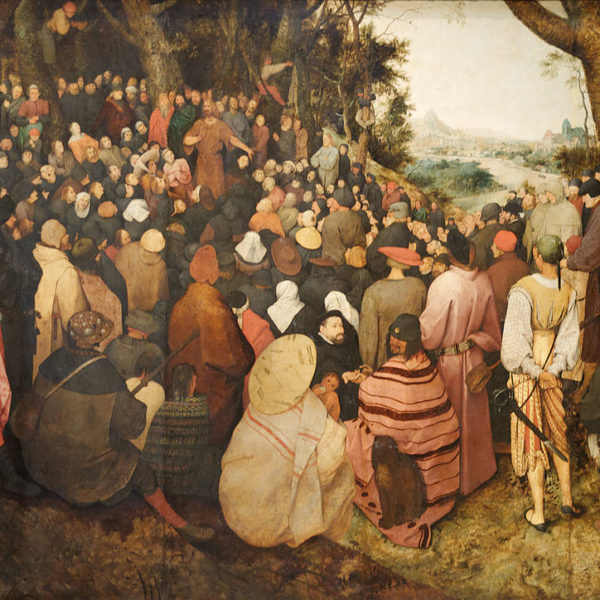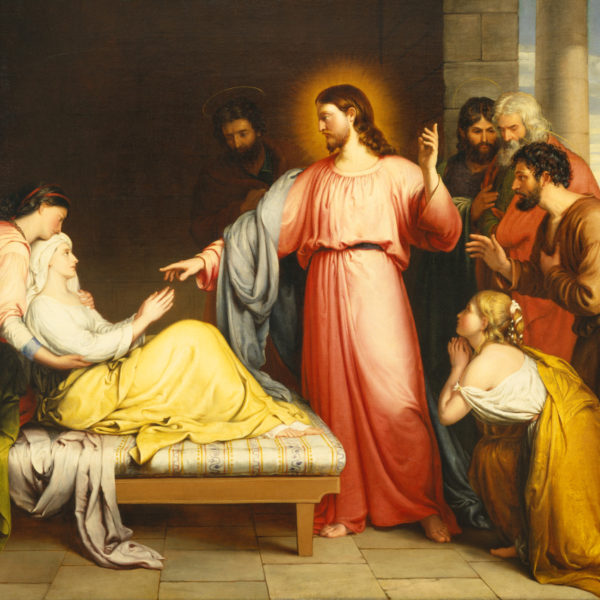
At moments of crisis, it can be the responsibility of committed individuals to secure and represent the self-understanding of the community or nation to which they belong, to provide the seed from which the entire social body can be renewed. Within easily neglected political dimensions of the baptism of John we may be recalled to our potential and vocation as political individuals in this regard.

Are we not the Gentiles who have leaders ruling over us? Are we not the ones who obey the rules that are placed upon us? Isn’t it true that we have tyrants that are more concerned the upper class and middle class than with those struggling to get by, living paycheck to paycheck? Jesus demands a non-leadership leadership from his disciples. Something more topsy-turvy than the world’s standards that resemble social Darwinism….

I have met some born-again Christians who act as if, in order for the modern Church to be given new life, we need only to recover the passion, vibrancy and hope of the Acts of the Apostles. That, if only we could live as those first disciples and apostles lived –selling our goods, holding everything in common, praying constantly – we would truly be welcoming the Kingdom. For, if we could only live thus, we would be Spirit-filled faith heroes, propagating the faith with the courage and energy of Paul. Beguiling as this way of thinking might be, it is ultimately open to serious question: it imagines that the Book of Acts is straight history rather than – at one level – propaganda. The growth of Christianity in the Mediterranean Basin was slower, patchier and more interesting than the propaganda would have us think. Nonetheless, I genuinely understand the enthusiasm for the born-again way of thinking because I’ve lived it. In my mid-twenties, in the first wild months of a newly-received faith, I felt those possibilities….

This teaching marks a turn to family ethics. The Pharisaic question about divorce again serves as a foundation upon which Jesus makes a larger teaching that transcends the context of their specific query to make a larger points. In this case, Jesus outlines an expansive family ethic rooted in an understanding that, with the family at the center of social life, intrafamilial ethics have vast political consequences. In discussing both marriage and children, Jesus imagines models of the family that are radically expansive relative to his context…

It seems easy. So easy we can almost brush it off. Smile approvingly at the Sunday School teacher seated across the aisle from us in worship, and check one more thing off our spiritual to-do-list. Welcome little children? Done. We might ask ourselves, “How dense could these power grubbing disciples have been to miss so simple a point as this?”
But take a look across that same aisle once again… If your church is like many, there may be an usher giving a mother a dirty look as she walks her small child to the bathroom. Or a father putting his finger to his lip, afraid that his toddler’s whispers might disrupt someone. Or maybe a middle-aged gentleman checking the church’s giving record, calculating in his head what percent of the church’s income comes from his check. Or a young woman dressed just so, glancing at a hand mirror to check her make up….

Actually Jesus invites folks of all political and religious persuasions to a kind of humility. The human heart has, despite itself, a king of genius for corruptibility, no matter what rituals or traditions we make for ourselves. There is only one hope: to begin to see ourselves aright. And that is done by being in relation with God. This does not lie so much in the feel-good individualistic transformations beloved of conservative evangelicals, but in the challenging praxis of being part of a community of hope and forgiveness….
By the time preachers in America address their congregations this Sunday, the nation’s Supreme Court will have ruled on the health insurance reform act passed by Congress and signed into law by President Obama in March of 2010. The coincidence of this much-anticipated ruling and a quirky Jesus healing story is irresistible!
In an age when nothing is sacred nothing is more difficult to understand than violations of sacred space. Yet that’s precisely what Mark demands of us in his account of Jesus’ first public action, an exorcism in the synagogue.
From the moment Jesus sets foot in the religious and political center of Capernaum, he is engaged in a contest with the scribes over authority concerning that space itself and all that it represents. It’s clear from the beginning that his audacious move catches the attention of everyone. The people notice: “They were astounded at his teaching, for he taught them as one having authority, and not as the scribes” (1:22).
The wilderness was not a place that good Romans went. In the view of Roman imperial cosmology, the wilderness was a place full of savage people to be subdued and conquered. The Augustus of Prima Porta statue, imaged here, shows precisely this view. The heavens come into alignment and the Gods look down in delight as the Parthian king surrenders to Rome. On either side, mourning barbarian women are curled in positions of submission. This is how Rome viewed the wilderness — the worlds of barbarian people and wild animals outside the boundaries of Roman control, and only fit into the Roman imagination once they had been subdued. This was the drama enacted regularly in the arena, where wild animals and foreign persons were slaughtered before adoring crowds.
It’s easy to read this week’s gospel as a warning of doom and gloom. It begins, after all, with this strict admonition, “Be Alert!” (v 23), and ends with the equally forceful command, “Keep awake!” (v 37). It’s as though Jesus has just shouted, “Watch out!” and thrown a ball of flaming fire into the crowd. But, of course, there is no fiery ball and so the question naturally is, “Watch out for what?” Within the pericope itself, the obvious answer becomes the awesome image that Jesus paints in verse 26: “The Son of Man coming in clouds with great power and glory.” And why should we be concerned? (Apart, of course, from the darkened moon and falling stars…) Because Jesus says the Son of Man is like a master returning and from there we write our own scripts of what wrath this master might bring. “Keep awake!” the Bible tells us, and we add, “Because if we sleep, we might be hit by that fiery ball!” And, indeed, for Matthew and Luke, who record this prediction as “a thief coming in the middle of the night,” rather than a master returning to his home, such fears may be warranted. But, for Mark, different dynamics are at play…
